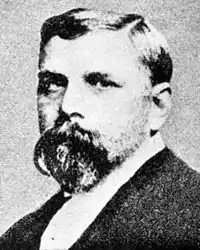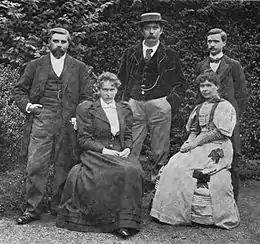Robert Barr (writer)
Robert Barr (16 September 1849 – 21 October 1912) was a Scottish-Canadian short story writer and novelist.
Robert Barr (writer) | |
|---|---|
 | |
| Born | 16 September 1849 Glasgow, Scotland, UK |
| Died | 21 October 1912 Woldingham, Surrey, England, UK |
| Pen name | Luke Sharp |
| Occupation | Educator, journalist, editor, publisher, novelist |
| Nationality | Scottish |
Early years in Canada
Robert Barr was born in Barony, Lanark, Scotland to Robert Barr and Jane Watson.[1] In 1854, he emigrated with his parents to Upper Canada at the age of four years old. His family settled on a farm near the village of Muirkirk. Barr assisted his father with his job as a carpenter, and developed a sound work ethic. Robert Barr then worked as a steel smelter for a number of years before he was educated at Toronto Normal School in 1873 to train as a teacher.[2]
After graduating Toronto Normal School, Barr became a teacher, and eventually headmaster/principal of the Central School of Windsor, Ontario in 1874.[3] While Barr worked as head master of the Central School of Windsor, Ontario, he began to contribute short stories—often based on personal experiences, and recorded his work. In August 1876, when he was 27, Robert Barr married Ontario-born Eva Bennett, who was 21.[4] According to the 1891 England Census, the couple appears to have had three children, Laura, William, and Andrew.[5]
In 1876, Barr quit his teaching position to become a staff member of publication, and later on became the news editor for the Detroit Free Press. Barr wrote for this newspaper under the pseudonym, "Luke Sharp." The idea for this pseudonym was inspired during his morning commute to work when Barr saw a sign that read "Luke Sharp, Undertaker." In 1881, Barr left Canada for England in order to start a new weekly version of "The Detroit Free Press Magazine."
London years

In 1881 Barr decided to "vamoose the ranch", as he called the process of immigration in search of literary fame outside of Canada, and relocated to London to continue to write/establish the weekly English edition of the Detroit Free Press.[6][7] During the 1890s, he broadened his literary works, and started writing novels from the popular crime genre. In 1892 he founded the magazine The Idler, choosing Jerome K. Jerome as his collaborator (wanting, as Jerome said, "a popular name").[8] He retired from its co-editorship in 1895.
In London of the 1890s Barr became a more prolific author—publishing a book a year—and was familiar with many of the best-selling authors of his day, including Arnold Bennett, Horatio Gilbert Parker, Joseph Conrad, Bret Harte, Rudyard Kipling, H. Rider Haggard, H. G. Wells, and George Robert Gissing.[3] Barr was well-spoken, well-cultured due to travel, and considered a "socializer."[3]
Because most of Barr's literary output was of the crime genre, his works were highly in vogue. As Sherlock Holmes stories were becoming well-known, Barr wrote and published in the Idler the first Holmes parody, "The Adventures of "Sherlaw Kombs" (1892), a spoof that was continued a decade later in another Barr story, "The Adventure of the Second Swag" (1904). Despite those jibes at the growing Holmes phenomenon, Barr remained on very good terms with its creator Arthur Conan Doyle. In Memories and Adventures, a serial memoir published 1923–24, Doyle described him as "a volcanic Anglo—or rather Scot-American, with a violent manner, a wealth of strong adjectives, and one of the kindest natures underneath it all".[9][10]
In 1904, Robert Barr completed an unfinished novel for Methuen & Co. by the recently deceased American author Stephen Crane entitled The O'Ruddy, a romance.[11] Despite his reservations at taking on the project, Barr reluctantly finished the last eight chapters due to his longstanding friendship with Crane and his common-law wife, Cora, the war correspondent and bordello owner.[8]
Death
The 1911 census places Robert Barr, "a writer of fiction," at Hillhead, Woldingham, Surrey, a small village southeast of London, living with his wife, Eva, their son William, and two female servants.[12] At this home, the author died from heart disease on 21 October 1912.[13][14]
Writing Style
Barr's volumes of short stories were often written with an ironic twist in the story with a witty, appealing narrator telling the story. Barr's other works also include numerous fiction and non-fiction contributions to periodicals. A few of his mystery stories and stories of the supernatural were put in anthologies, and a few novels have been republished. His writings have also attracted scholarly attention. His narrative personae also featured moral and editorial interpolations within their tales. Barr's achievements were recognized by an honorary degree from the University of Michigan in 1900.
His protagonists were journalists, princes, detectives, deserving commercial and social climbers, financiers, the new woman of bright wit and aggressive accomplishment, and lords. Often, his characters were stereotypical and romanticized.
Barr wrote fiction in an episode-like format. He developed this style when working as an editor for the newspaper Detroit Press. Barr developed his skill with the anecdote and vignette; often only the central character serves to link the nearly self-contained chapters of the novels.[3]
Works
- In a Steamer Chair and Other Stories (Thirteen short stories by one of the most famous writers in his day -1892)
- "The Face And The Mask" (1894) consists of twenty-four delightful short stories.
- In the Midst of Alarms (1894, 1900, 1912), a story of the attempted Fenian invasion of Canada in 1866.
- From Whose Bourne (1896) Novel in which the main character, William Brenton, searches for truth to set his wife free.
- One Day's Courtship (1896)
- Revenge! (Collection of 20 short stories, Alfred Hitchcock-like style, thriller with a surprise ending)
- The Strong Arm
- A Woman Intervenes (1896), a story of love, finance, and American journalism.
- Tekla: A Romance of Love and War (1898)
- Jennie Baxter, Journalist (1899)
- The Unchanging East (1900)
- The Victors (1901)
- A Prince of Good Fellows (1902)
- Over The Border: A Romance (1903)
- The O'Ruddy, A Romance, with Stephen Crane (1903)
- A Chicago Princess (1904)
- The Speculations of John Steele (1905)
- The Tempestuous Petticoat (1905–12)
- A Rock in the Baltic (1906)
- The Triumphs of Eugène Valmont (1906)
- The Measure of the Rule (1907)
- Stranleigh's Millions (1909)
- The Sword Maker (Medieval action/adventure novel, genre: Historical Fiction-1910)
- The Palace of Logs (1912)
- "The Ambassadors Pigeons" (1899)
- "And the Rigor of the Game" (1892)
- "Converted" (1896)
- "Count Conrad's Courtship" (1896)
- "The Count's Apology" (1896)
- "A Deal on Change " (1896)
- "The Exposure of Lord Stanford" (1896)
- "Gentlemen: The King!"
- "The Hour-Glass" (1899)
- "An invitation" (1892)
- " A Ladies Man"
- "The Long Ladder" (1899)
- "Mrs. Tremain" (1892)
- " Transformation" (1896)
- "The Understudy" (1896)
- " The Vengeance of the Dead" (1896)
- "The Bromley Gibbert's Story" (1896)
- " Out of Thun" (1896)
- "The Shadow of Greenback" (1896)
- "Flight of the Red Dog" (fiction)
- "Lord Stranleigh Abroad" (1913)
- "One Day's Courtship and the Herald's of Fame" (1896)
- "Cardillac"
- "Dr. Barr's Tales"
- "The Triumphs of Eugene Valmont"
Sources
- Bleiler, Everett (1948). The Checklist of Fantastic Literature. Chicago: Shasta Publishers. p. 41.
References
- Ancestry.com. Scotland, Select Births and Baptisms, 1564-1950 [database on-line]. Provo, UT, USA: Ancestry.com Operations, Inc., 2014. FamilySearch, 2013.
- "Ancestry Library Edition". ancestrylibrary.proquest.com. Retrieved 21 February 2019.
- "Dictionary of Canadian Biography". Retrieved 21 February 2019.
- "Robert Barr." Archives of Ontario; Toronto, Ontario, Canada; Registrations of Marriages, 1869-1928; Reel: 20. Ancestry.com and Genealogical Research Library (Brampton, Ontario, Canada). Ontario, Canada, Marriages, 1826-1937 [database on-line]. Provo, UT, USA: Ancestry.com Operations, Inc., 2010.
- "Robert Barr." The National Archives of the UK (TNA); Kew, Surrey, England; Class: RG12; Piece: 1034; Folio: 92; Page: 50. Ancestry.com. 1891 England Census [database on-line]. Provo, UT, USA: Ancestry.com Operations Inc, 2005.
- Stephen Knight, introduction to The Triumphs of Eugène Valmont. (NY: Oxford University Press, 1997), x.
- "Literature in Canada." The Canadian Magazine, XIV, 1 (November 1899), 3-7.
- Wertheim, Stanley (1997). A Stephen Crane Encyclopedia. Greenwood Publishing Group. pp. 19–20.
- "Robert Barr - Biography and Works. Search Texts, Read Online. Discuss". www.online-literature.com. Retrieved 21 February 2019.
- Knight, x-xi.
- The Saturday Evening Post, V. 176, No. 27, January 2, 1904, p. 20.
- Class: RG14; Piece: 3251; Schedule Number: 249. Ancestry.com. 1911 England Census [database on-line]. Provo, UT, USA: Ancestry.com Operations, Inc., 2011. Census Returns of England and Wales, 1911. Kew, Surrey, England: The National Archives of the UK (TNA), 1911.
- The New York Times. 23 October 1912.
- Who's Who 1914, xxi
External links
| Wikisource has original text related to this article: |
| Wikiquote has quotations related to: Robert Barr (writer) |
- Biography at the Dictionary of Canadian Biography Online
- Jerome K. Jerome, My Life and Times (1926)
- Works by or about Robert Barr at HathiTrust
- Robert Barr at the Internet Speculative Fiction Database
Electronic editions
- Works by Robert Barr at Project Gutenberg
- Works by Robert Barr at Faded Page (Canada)
- Works by or about Robert Barr at Internet Archive
- Works by Robert Barr at LibriVox (public domain audiobooks)

- Works by or about Robert Barr at The Literature Network
- FREE Sony Reader e-book version of The Triumph of Eugene Valmon by Robert Barr